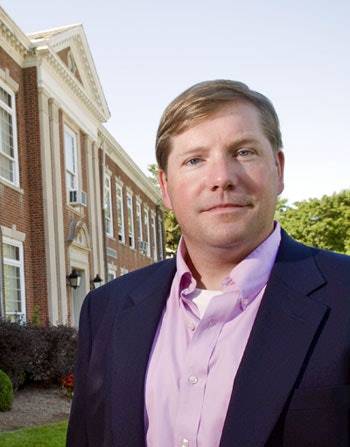 Patrick McGuinn, an associate professor of political science and education at Drew University, says teacher evaluation reform is the next “big frontier.”
Patrick McGuinn, an associate professor of political science and education at Drew University, says teacher evaluation reform is the next “big frontier.”Washington – As states begin to roll out new systems for teacher evaluation, institutions of higher learning should position themselves to be partners in the process and incorporate the new measures into their teacher prep programs.
That was one of the key takeaways from a panel discussion at the Center for American Progress Tuesday titled “The State of Teacher Evaluation Reform: State Education Agency Capacity and the New Teacher Evaluation Systems.”
Forum speaker Patrick McGuinn, associate professor of political science and education at Drew University, said teacher evaluation systems represent the next “big frontier” in education reform.
“This is hard, complicated work,” said McGuinn, who released a paper Tuesday that provides an overview of where half a dozen states stand with respect to their efforts to implement new teacher evaluation systems.
It is also relatively new.
In his paper, McGuinn maintains that “not enough communication and sharing of information about effective measures is happening yet,” and that state education agencies must perform a “delicate balancing act” to fulfill their dual roles of providing support and monitoring for compliance.
McGuinn’s paper, which comes at a time when the Obama administration has focused increased attention on issues of teacher quality, examines teacher evaluation systems in Tennessee, Colorado, New Jersey, Pennsylvania, Delaware and Rhode Island, which are all “early adopters” in the area of teacher evaluation reform.
Two of the states — Tennessee and Delaware — won federal Race to the Top grants for $500 million and $100 million, respectively. McGuinn said funding for teacher evaluation reform can be a challenge for states that didn’t win Race to the Top grants or secure support from the foundation world.
“Given the current tight fiscal climate, most states have been unable or unwilling to allocate new money to support the implementation of these reforms,” the paper states.
The paper found wide variation in the way that states are going about the business of teacher evaluation. For instance, Tennessee has a statewide teacher evaluation model that local school districts are legally required to adopt. Teachers are evaluated based on observation, student growth and student-achievement data selected by the teacher and a supervisor for a state list of approved choices, the paper states. The system was implemented last school year.
Delaware also has a single statewide evaluation model but local school districts can use an alternative evaluation model in conjunction with the state model. The system—implemented this school year—utilizes various measures that include student growth.
The paper makes a series of recommendations, including some that relate to higher education.
One such recommendation is that state legislatures and state education agencies should determine how teacher evaluation work should be connected to other education reforms, particularly those that involve teacher preparation.
Panelist Carolyn Williams, Assistant, Educational Services and Project Coordinator, New York State United Teachers (NYSUT), said her organization has worked with universities to develop teacher evaluation instruments in New York.
“We collaborate with our SUNY and CUNY colleges quite a bit,” Williams said. She said educators in teacher prep programs should make their students aware of the evaluation tools and how the tools will be used to evaluate them in the classroom.
Panelist Mary Ann Snider, Chief of Educator Excellence and Instructional Effectiveness at the Rhode Island Department of Education, said her state has begun conversations with institutions of higher learning to discuss gaps between teacher prep programs and what is needed in the classroom, and for students to achieve a deeper understanding of standards as they leave teacher prep programs and enter practice.
“Higher education is coming to the table willingly and readily,” Snider said. “It’s a pretty easy fit.”
Snider also touted the need for “raising expectations” for teacher candidates and requiring higher scores on teacher certification exams as a means of getting more effective teachers into the classroom.
That prompted concern from audience member Jolanda Westerhof, director of Teacher Education for the American Association of State Colleges and Universities.
“When there’s a discussion about narrowing the candidate pool or raising standards, that in and of itself is a concern if there aren’t other mechanisms in place to make sure you’re going to work and expand the diversity of the teaching pool,” Westerhof said.



















